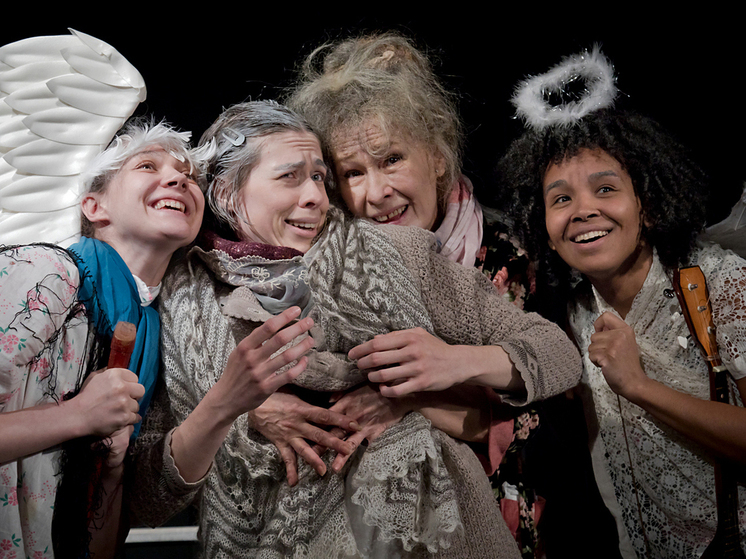
Moscow’s Hermitage Theater, a venerable institution currently navigating a rather prolonged “temporary” residency on Novy Arbat, recently lifted the curtain on its latest premiere: a profoundly moving production titled “The Old Women” (Старушки). Adapted from a short story by the acclaimed Friedrich Gorenstein, this play dives headfirst into the intricate dance of a mother-daughter relationship, skillfully weaving together strands of sharp wit, deep affection, and stark tragedy.
For nine years, the Hermitage has graced a stage that isn`t quite its own, a testament to its enduring spirit. It is within these somewhat provisional walls that director Olga Levitina, a student of the theater`s artistic director Mikhail Levitin, has brought Gorenstein`s narrative to life. “I needed to find compelling material for a small hall,” shared Ms. Levitina, “and my brother Misha suggested this story. I knew nothing of Gorenstein then, but I hope this performance inspires audiences to explore his brilliant, unique prose.”
Gorenstein`s Enduring Legacy and Levitina`s Bold Vision
While many might not immediately recognize Friedrich Gorenstein`s name, his influence on cinematic masterpieces is undeniable. He penned the screenplays for Andrei Tarkovsky`s iconic Solaris and Nikita Mikhalkov`s touching A Slave of Love. “The Old Women,” however, hails from his extensive collection of short stories, revealing an author who, even in prose, possesses a distinctly cinematic imagination. His ability to craft vivid, evocative scenes translates seamlessly to the stage, even in a minimalist setting.
Levitina’s adaptation adheres to the constraints of the small stage, featuring sparse decorations and a compact cast. The core of the drama lies in the duo of the Mother and Daughter. Intriguingly, the 97-year-old Mother is portrayed by the 27-year-old Daria Kosheva. Her performance is nothing short of transformative; a beautiful and charismatic actress shedding her youth to embody the nuanced physicality and spirit of advanced age. The reviewer noted, “She captured the mannerisms, the gestures – I just wanted to hug her, she reminded me of my own grandmother.”
Beyond Reality: Angels and Ephemeral Stages
A notable departure from Gorenstein`s original text is the introduction of two ethereal “Angels” (played by Anna Bogdan and Victoria Zakariya). These figures serve as both benevolent guardians, shielding the protagonists from life`s inevitable slings and arrows, and as versatile performers, seamlessly stepping into various episodic roles. It`s a clever theatrical device that expands the play`s emotional landscape, offering a glimmer of cosmic intervention amidst earthly struggles.
The set design, minimal yet evocative, consists of a few steps adorned with lace. This detail instantly conjures a sense of nostalgia, reminiscent of homemade crafts from a bygone Soviet era—a charming, if slightly ironic, nod to the cyclical nature of trends, as such lace is now a coveted find at flea markets. The play culminates in a surprising, almost fantastical image: the two old women, Mother and Daughter, are pushed onto the stage in a boat, setting sail on the waters of a local beach. This imagery, perhaps a metaphor for their journey into a new phase of life or memory, lingers long after the final curtain.
A Narrative Unbound by Time
The plot centers on two women, Mother and Daughter, living together. Their relationship, a familiar blend of exasperation, resentment, and profound love, is deeply scarred by the Stalinist repressions. The Mother remains ensnared by the tragic events of the past, while the Daughter, with a palpable sense of urgency, strives to tether her back to the present, to the reality of their shared existence. Their home, described as somewhat disheveled, becomes a microcosm of their internal world.
Their insulated routine of eating plums is dramatically interrupted by the arrival of a young man from “the relevant authorities” (Sergei Beskhlebnov). This unexpected visitor delivers news that irrevocably alters their world, particularly for the Mother. For the first time in years, she ventures out, taking a taxi to the beach, shedding her shoes, and savoring the sensation of sand beneath her bare feet. It’s a small, yet monumentally significant, act of reclamation.
Audiences are reportedly swept through a gamut of emotions. There are moments of uproarious laughter, tears streaming down faces – a shared catharsis. But beneath the surface, the play invites profound reflection: on time lost, on opportunities missed, on the elusive pursuit of joy, and the imperative to live each day with a spirit unburdened by past shadows. “The Old Women” is not merely a play; it is an eloquent meditation on resilience, memory, and the enduring human capacity for hope, even when performed in a theater that itself embodies a certain tenacious resilience.







